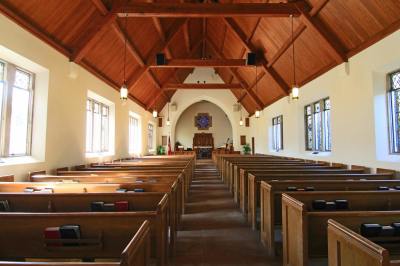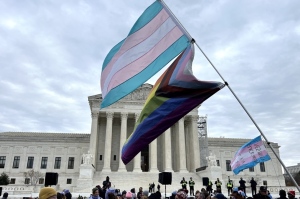‘Church hurt’ is not an excuse for apostasy

The minister Charles Morrison once wrote,
“The Christian church is a society of sinners. It is the only society in the world membership in which is based upon the single qualification that the candidate shall be unworthy of membership.”
Anyone who has spent any time in a church has, at some point, been offended or disappointed by another believer. The reality is that conflict arises when sinners are gathered together. Although saved by grace, we are still living in unredeemed human flesh, battling sin constantly.
Jesus acknowledged that this would be the case when he laid out steps for us to resolve conflict with one another in Matthew 18. He instructed us to confront our brother or sister who has sinned against us privately to tell them their fault, bearing in mind that we should be slow to anger and quick in our attempt to overlook offense (Proverbs 19:11). If our brother or sister refuses to repent and ask forgiveness, then we would bring in a witness. Still, then, if he or she refuses to repent after the issue has been escalated and brought before church members, then he or she must be treated as a Gentile or tax collector. This is biblical church discipline.
Scripture is not shy when it comes to conflict within the Church nor is it shy when it comes to resolution. The book of Galatians speaks thoroughly on legalism. Colossians provides clarity when it comes to heresy. 1 and 2 Corinthians address sexual sin, lovelessness, pride, and self-righteousness. Philippians sheds light on selfishness. 2 Timothy acknowledges changes in church leadership. And the book of Revelation describes five churches that have a variety of problems that exist in many churches today.
Conflict is inevitable, but an indication of a healthy and holy church is one that handles such conflict biblically. Likewise, an indication of a faithful Christian is one who handles such conflict with humility, grace, and love. “Church hurt” from such conflict is real, but it is never an excuse to apostatize from the faith.
Rejecting the Church, rejecting God’s Word, and slandering the bride of Christ as a result of church hurt is a sin, and it must be dealt with accordingly.
Wolves among sheep
The first kind of church hurt is the result of legitimate abuse, mistreatment, and sin occurring among church members, staff, elders, or even from the pulpit.
The prevalence of this is simply the byproduct of pastors and elders failing to practice the discipline of Matthew 18. Devastation has occurred in many churches across the globe due to sinful men who fail to repent and professing believers who claim that it isn’t their place to judge them or hold them accountable. As a result, churchgoers face crushing consequences which could easily be avoided, if only sin and conflict were dealt with appropriately.
Paul warned us in Acts 20 of how wolves would creep into the Church, leading people astray and worshiping the god of their belly. They practice sins of legalism, heresy, infidelity, abuse, selfishness, and pride — all things Scripture teaches us how to deal with. Yet so often, these sins go unaddressed and without consequence.
Shepherds herding goats
In the same way, that discipline should be used to correct the sins of church leaders, it should also be used to correct the sins of churchgoers. The second kind of church hurt can be boiled down to pride and love of sin. You’ll often find that those who claim to be most hurt by their church have a story about feeling judged and unwelcomed. They often end up leaving the church, claiming they are “spiritual rather than religious,” and that they have a great relationship with God which involves occasionally worshiping Him from their couch on Sundays. They escape accountability, refuse to repent of their sin, and insist that the Church should “love and accept them” anyway. Often, this leads to the destruction of their faith entirely.
The harsh reality is that these individuals love their sins more than they love Christ. This isn’t a problem of true church hurt. They simply hate His Word and His Church for which He died. They are goats — the ones whom Jesus will separate from His sheep during the final judgment (Matthew 25:31-33).
In either case, the problem is sin
The only solution is repentance. When a sinner refuses to repent and ask for forgiveness, Scripture says that he or she should be treated as an unbeliever.
Whether or not a person has been hurt by someone in their local church or they have committed sins of which they are too proud to repent, leaving the Church entirely is an indicator of someone still walking in the flesh. (There may be some cases in which it is wise to leave a church to find a new one, but a genuine believer who belongs to the universal Church seeks to find a church that is righteous and unified and whose members are walking worthy of the calling.)
Jesus speaks of those who leave the Church in 1 John 2:19:
“They went out from us, but they were not of us; for if they had been of us, they would have continued with us. But they went out, that it might become plain that they all are not of us.”
Those who abandon the Church were never a part of it to begin with. They were never believers. They were never of the faith.
Repentance, reconciliation, restoration
One who is truly in Christ remains in the Church. One who is truly in Christ would never even think to abandon His bride because they love His bride, grieve when sin is present, and desire to see the sin eliminated entirely so that she may be presented holy and righteous before Him. One who is truly in Christ loves His Word and desires to obey it. One who is truly in Christ is spurred on to reconcile with other believers they may have sinned against or who may have sinned against them.
This is why it is so important that in our walks with the Lord, we strive for holiness. We should desire to become more like Christ, grieving and lamenting our sin, and turning from darkness to light (Acts 26:18). We pray for discernment, we examine ourselves in order to blot out sin (2 Corinthians 13:5), and we even refrain from partaking in the Lord’s table if we are at odds with a brother in Christ (1 Corinthians 11:27-29). Not only does this add to our own sanctification, but it results in unity within the Church under the authority of Christ.
Apostasy, “deconstruction,” and spirituality in rejection of religion are never an option for the Christ follower. No matter what a believer experiences in the pew, he or she loves the Church and hates sin enough to make things right. That may mean confronting church leadership. That may mean inviting a brother or sister over for dinner to reconcile and restore relationships. That may mean apologizing to a brother or sister we may have sinned against.
In any circumstance, the point is reconciliation back to God — never abandonment of His bride.
Originally published at the Standing for Freedom Center.
Reagan Scott is a Louisiana-raised Christian conservative activist and influencer who gained national attention after she lost her job for speaking out about her biblical and conservative beliefs online. She jumped at the invitation to relocate to Phoenix, AZ to work as a media administrator for Turning Point USA.
As she got more involved in conservative activism, Reagan quickly realized a deep divide among professing Christians and became convicted by the lack of the gospel message in Christian conservative circles. While Christians so often find themselves desiring to “fix” the culture, they often need the reminder that the problem in our culture is sin, and the only solution is the saving work of Jesus Christ. Since working for Turning Point USA, Reagan has begun communications work for a political campaign and miscellaneous student organizations and ministries, all while utilizing the online platform God gave her by pointing young Christians and conservatives to biblical truth.
Reagan currently resides in Dallas, TX with her husband and two cats, where she enjoys reading books, making homemade household cleaning items, and eating good food.




























